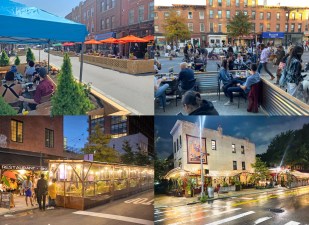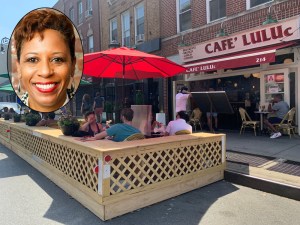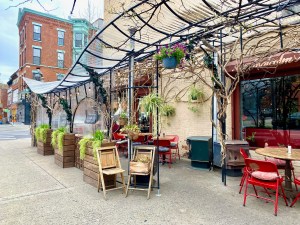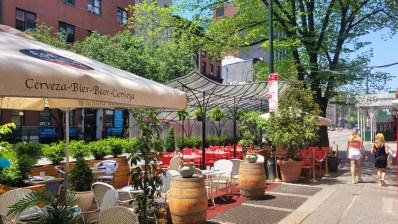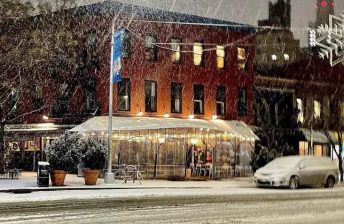Council ‘Almost There’ on Permanent Open Restaurants: Speaker Adams
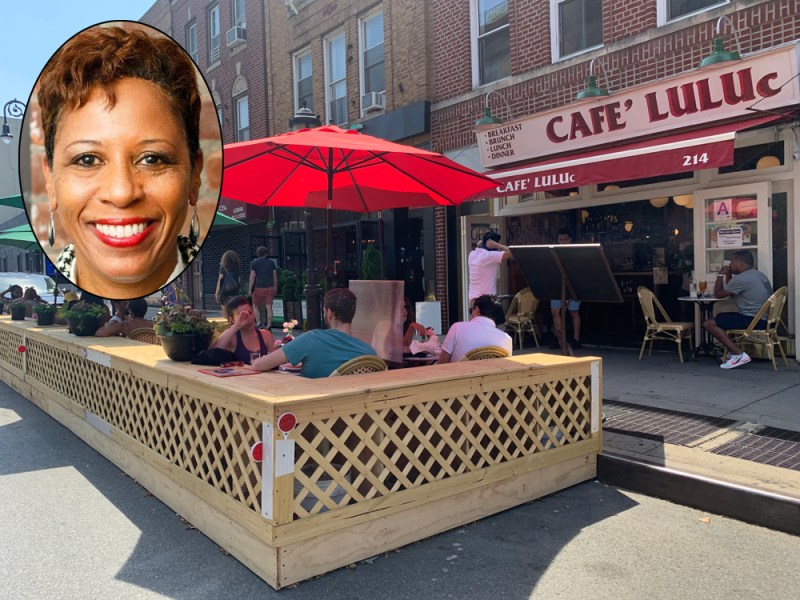
The Council will pass a long-delayed bill to create a permanent outdoor dining program “very very soon,” but is still working out final details to find the right “balance,” Speaker Adrienne Adams said on Tuesday.
The restive Council lawmakers are struggling to account for the needs of restaurant owners as well as the differing demands of the many diverse neighborhoods of the city, Adams said at a Brooklyn Chamber of Commerce breakfast.
“We’re almost there, so we’ve got high hopes for something happening very very soon,” said Adams, who represents a district in southeastern Queens. “We’re now working towards making something that has the proper balance for restaurant owners and the neighborhoods that they’re located in.”
The vast majority of the Council’s 51 elected members — including Adams — didn’t respond to Streetsblog with their specific preferences about what the future of the al-fresco eateries should look like, but the speaker said that most of her colleagues on board with some form of a permanent successor to the pandemic-era Open Restaurant program created during the de Blasio administration.
“I know that my colleagues — for the most part — do want to see the program continue,” she said. “It is something that we are close to finalizing.”
Previously, Adams has said that her personal opinion is that “streeteries” should be on the sidewalk instead of in the curbside lanes, but on Tuesday, in front of Brooklyn business leaders, she was far more effusive in her praise of the program’s life- and business-giving qualities.
“New York looks like Paris in some places — better than Paris actually in some places, especially here in Brooklyn, I must say,” Adams said. “To come through this pandemic and create something so out of the box I think that it would be a tragedy to throw that away.”
It remains unclear where the Council will site the dining areas.
The current version of the bill by Council Member Marjorie Velázquez (D-Bronx) is neutral on that topic. But it proposes to move the program itself from the Department of Transportation back to the Department of Consumer and Worker Protection, which ran the more restrictive sidewalk café licenses. The proposed law would also turn the all-year program into a seasonal initiative for the warmer months.
Mayor Adams wants to keep the program with DOT, and advocates agreed, warning that shifting responsibility to the much smaller consumer protection agency would effectively revert it to the old regime.
Opponents of the program, largely in Manhattan neighborhoods that have a lot of restaurants such as the East Village and Chinatown, held up progress for months after they mounted a pair lawsuits that complained of noise and garbage, plus a loss of parking.
The scaled-down pandemic regulations allowed outdoor dining to grow 12-fold “practically overnight” and expand to dozens of neighborhoods that didn’t have it before the descent of the disease — particularly blue-collar neighborhoods of color like Speaker Adams’s own district, a recent NYU report found.
The lawmakers should learn from that success by making it affordable and easy for restaurants to set up outside, no matter where they are in the city, said Andrew Rigie, the head of the New York City Hospitality Alliance, the industry’s lobbying group.
“We are one city with five boroughs, so we should have a uniform set of standards that apply across the city so it does again not discriminate against smaller restaurants, particularly those in upper or outside of Manhattan,” Rigie said. “However, if there’s certain location-specific issues they should be considered.”
The initiative’s uncomplicated requirements actually enabled restaurateurs to tailor their sheds to their communities, said Jackson Chabot, director of advocacy at Open Plans (a sister organization of Streetsblog).
“One of its best pieces of this program is restaurateurs have adapted to the different needs of their contexts,” he said.
